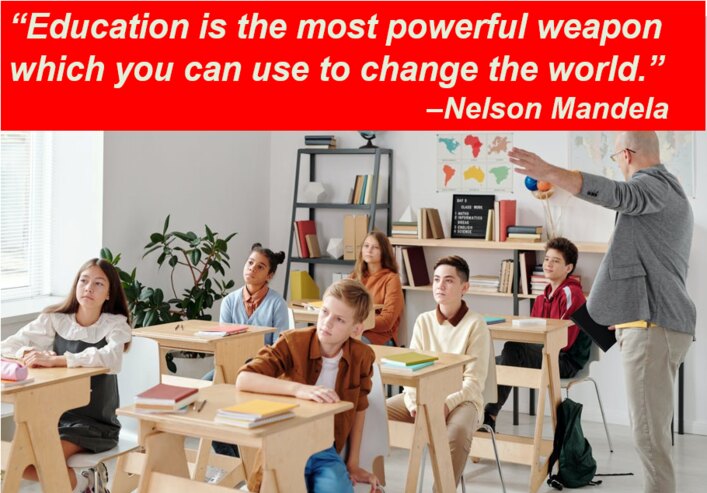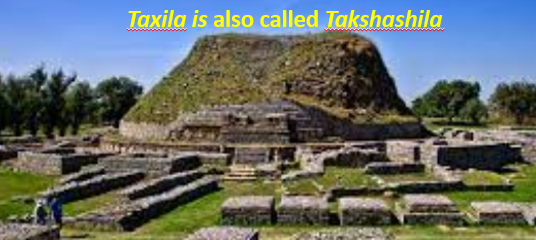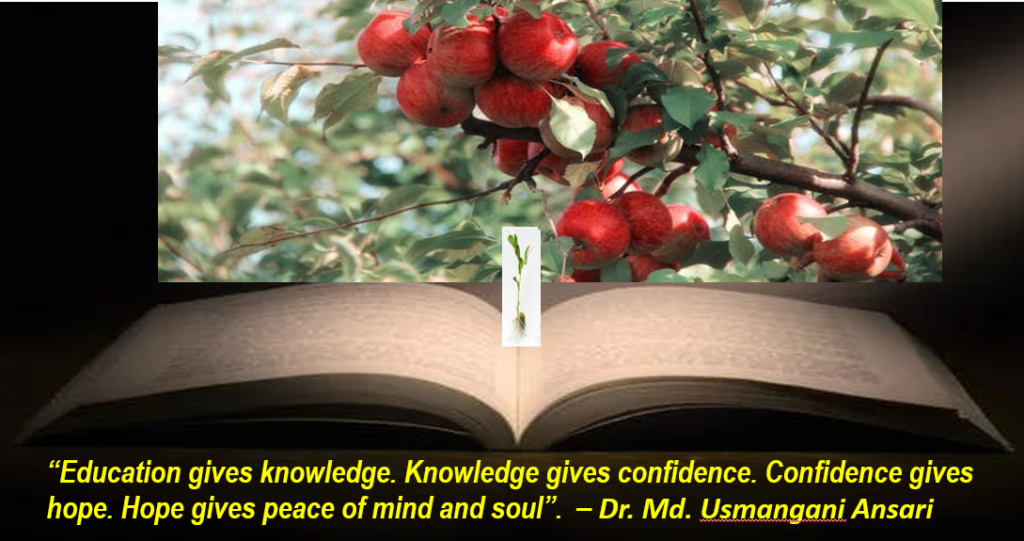Importance of Education in our career and life: Education is primarily a continuous process of teaching and learning to draw out the divine potential already existing in an individual throughout the life since childhood. The role of education is to teach, guide, and train an individual as per age and grade to think critically, rationally, and morally for the betterment of self, family, society, and humanity.
The purpose of education, since ancient times, is to nurture a child in a way to bring into adulthood a full realization of how to be a good human being and citizen. In this article we have discussed the importance of education including “how a child can be morally, creatively, and productively developed for society and humanity”.
Table of Contents

Importance of Education: Meaning of Education and Its Sources
Meaning of education: Before coming to the importance of education, let’s first know the meaning of education.There are different learned educationists who said that the word “education” is derived from Latin words, educare, educere, and educatum. Some of them say that education is derived from the-
Latin word “educare” means “to bring up” or “to raise”.
Latin word “educere” which means “to lead forth” or “to come out” or “take out” or “conduct from the inside to the outside”. It means ‘improvement’, ‘enhancement’, ‘progress’.
Latin word “educatum” which means “developing or progressing movement from inward to outward”.
You knew the meaning of education, let’s know its definition and also importance of education below.
Definition of Education
The word “education” is defined by different persons, philosophers, organizations in different ways. Some of its definitions are given below:
“Education is a means to answer what, why, who, when, how, etc. of self, others, and know better about rights and duties towards yourself, family, society, nation, humanity, and nature.”__ Dr. Md. Usamangani Ansari
Swami Vivekanand defined it as ‘Education means drawing out the divine potential already existing in man.’
According to Aristotle ‘Education is the creation of a sound mind in a sound body…’
Aristotle also said that ‘Educated men are as much superior to the uneducated as the living are to the dead.’
In the Rig Veda it is said that ‘Education is that which makes a man self-reliant and selfless.’
In the Vedic Prayer it is said that ‘Education leads us from falsehood to truth, from darkness to light and from mortality to immortality.’
According to Dayanand Saraswati ‘Education is a means for character formation and righteous living.’
‘Education is the all round drawing out of the best in the child and man body, mind and spirit’ as said by Mahatma Gandhi
According to Pestalozzi ‘Education is the natural, harmonious and progressive development of man’s innate power.’
John Dewey said that ‘Education is the development of all those capacities in the individual which will enable him to control his environment and fulfill his possibilities.’
John Adams’s definition – ‘Education is a bipolar process where one personality acts upon another in order to modify the development of others’.
In addition to definition of education some important facts related to education are as:
Education is given first place by some person or religion
Person or Religion | Place |
Manu who wrote Manusmriti (first ancient legal text)* gave | “First place to Shiksha i.e. education” |
Gautam Buddha also placed | “Right knowledge” first |
Islam religion’s first word | “Iqra” which means “to read” i.e. education |
One of the first 3 duties of Islamic parents towards their children is | “Right nurture (Sahi taleem aur tarbiyat)” i.e. right education |
Cicero (2000 years ago) said, | “Education is the best gift we can give to the youth” |
* According to Hindu religion
Importance of Education: Brief History of Education in Ancient India
Before coming to importance of education let’s know here its brief history. Education in ancient India starts through the Vedic and Buddhist system of learning. Vedic system of learning used Sanskrit as the medium of language whereas the Buddhist used Pali language as the medium of instruction. In Vedic system a child started his learning at the age of 8 to 12 but in the Buddhist system the age was 8 years. The main purpose in ancient India learning was character building, art of self-control, social values, and conservation and propagation of ancient culture.
In Vedic system four Vedas – Rig, Sam, Yajur, and Atharva Vedas were taught to children. They used to study 6 Vedangas like rituals, metrics, exegetics, grammar, phonetics, astronomy, the Upanishads, etc. From about 1500 B to 600 BC it was based on the Veda – hymn, formula, incantations, recitation or chant by priests. There was also a traditional Hindu residential system of learning called “Gurukula”. It was the teacher’s house or a monastery. At the Gurukulas, the Guru (teacher) used to teach about religion, philosophy, scriptures, literature, warfare, medicine, astrology, and history.
In the Buddhist system of learning the subjects were different Pitakas – Vinaya Pitaka, Sutta Pitaka, Abhidhamma Pitaka. The Buddhist monks (Sanga) were taught about the Vinaya Pitaka to follow discipline when talking to people and nature. They had to ensure that people, animals, nature, and even the environment were not harmed by the Bhuddhist monks. The Sutta Pitaka subject has 5 niyakas (collections) containing Buddha’s teachings recorded as sermons given at different places at different occasions. The summary and analysis of Buddha’s teachings are given in Abhidhamma Pitaka.

The early ancient Vedic or Hindu and Buddhist centre of learning from the 6th century BC to the 5th century AD was Taxila also called Takshashila. Another Buddhist centre of learning from the 5th century AD was Nalanda in the kingdom of Magadha. It was one of the many well known Buddhist monasteries. It had become a very attractive centre of learning where students and scholars from China, Tibet, Korea and Central Asia traveled for learning. One of the largest Buddhist monasteries was Vikramashila which was established in the 8th to 9th centuries. We will know the concept and importance of education below.
| IAS Full Form |
Importance of Education: Concept of Education
Education is the means of a process which facilitates the learning or acquisition of values, beliefs, knowledge, skills, habits, and truth of life in the light of social relationships to individuals or groups of people who transfer them to other people, through teaching, storytelling, discussion, example, training or research.

Education is a dynamic process of learning and acquiring knowledge related to oneself, family, society and humanity and interdependence on one another as per need and time. It is a means to draw out the inner potentials of a child and make him or her to realise, develop, and use for the betterment of self and others. Thus, you can understand the importance of education as it can be used to ‘drawing out’ from inside of an individual rather than ‘put in’ something inside from outside.
Moreover, education is an inseparable gift in the life of an individual which influences his or her physical, intellectual, social, emotional, ethical, creative, and spiritual development in a dynamic manner to solve the problems of life. Hence it is the process of teaching and learning from womb to tomb between teacher and learner in which teachers are parents, school teachers, coaching tutors, university lecturers, research guides, etc.
- Albert Einstein’s quote, “Education is what remains after one has forgotten what one has learned in school.”
- “Education gives knowledge. Knowledge gives confidence. Confidence gives hope. Hope gives peace”. – Dr. Md. Usmangani Ansari
Importance of Education: Naked Truth of Life in Education’s Light
There are countless truths of life which can be seen and faced in life but can’t be observed, realised and valued without having a visionary education. When we see truth of life with the help of education’s vision, then we realized the importance of education. Some of the naked truth of life are given below:
The best gift of life | Education |
The greatest teacher | Who makes you to observe, think, analyse then act and learn a lesson from the result |
The wisest man | Who does what he thinks right |
The most effective power | Knowledge |
The greatest need | Commonsense |
The best day | Today |
The right time | Just now |
The greatest time | Fear |
The greatest moment | Recognition by the society |
The most dangerous thing | Hatred |
The meanest feeling | Jealousy |
The most reliable friend | Your own hand |
The greatest trouble maker | Talking too much |
The most blessed person | Who is devoter to work |
The biggest fault | To waste your time |
The cheapest thing to do | Finding others’ fault |
The best part of anyone’s religion | Gentleness, cheerfulness and courtesy |
Purpose of Education: Aims and Objectives
We can know the importance of education when realised its purpose in life. Purpose of education is the fundamental need of a human being which gives a sense to his or her actions to achieve goals and objectives within deadline in life for self or other fellows of society. We can say that purpose is the reason why an individual aims to achieve a goal set before. Unlike goal, purpose is broader and deeper in sense which influences every goal.
Education has many purposes in the life of individuals or children for which they act to achieve set goals and objectives to fulfill diverse needs of personal, social, spiritual, economic, cultural, political and other realities of individual or collective lives of society. For example, its purpose for a student is to compete with other students in securing a dignified government or private jobs with decent salary, post, perks, and power.
Some of important aims and objectives of education are to provide knowledge, skills to child for leading day to day life, take care of health, earn livelihood, to be good and caring member of family, society, an intellectual, a better citizen; to be honest, truthful, cultured, civilized human beings, and many more.
- John F. Kennedy said, “The goal of education is the advancement of knowledge and the dissemination of truth.”
Importance of Education: Function of Education
Education plays a key role for the wellbeing of individual life, family development, welfare of society, national economic growth, and betterment of humanity. Its function includes many roles it plays in individual, social, moral, cultural, economic, intellectual, and political development of society, nation, and humanism.
The role of education towards individuals since childhood is to develop their inborn potentials and to modify their behavior as per need of wellbeing. It plays a key role in all round development of a child including physical, mental, intellectual, spiritual, emotional, etc. It develops the personality of a child to grow as a responsible adult to be recognized in society. It helps a child to adjust with others in family, school, and neighbors. It also prepares children to earn their livelihood.
It prepares children to learn the values of a dynamic society for their development and other fellows. Because we are a social animal we can’t live lonely as a bist. It helps to learn from past experiences and change for better results. It also educates about natural phenomena and how to adjust with the environment.
Education helps individuals to know their fundamental, political, natural, religious, economic rights and duties in a better way to understand different institutions, their norms for their own welfare and of society. It develops the leadership quality of a child through participation in different social, political, cultural and educational activities of school. As a result it plays a key role towards nation building. Hence, education is the most important tool and the ultimate pathway of success in every walk of life. Let’s discuss the importance of education and its benefits in our lives below.
Relevant articles:
Importance of education: meaning, concept and role in our life.
Benefits of Education in Life
Education’s benefits in every person’s life must be realized because of its importance for the progress of individuals and society. Importance of education is to make a child grow into a rational and intellectual adult to develop society, nation, and mankind together. An educated person is more capable to think over any problem of family, society, and the nation and its solution in a better way. There are various benefits of education in life as it develops human personality, thought process, scientific and social skills to know self and others in society and behave accordingly. The importance of education are also:
- Education opens the door of good career building for any individual in a better way.
- It provides opportunities for better and decent jobs.
- It is the means of learning things, acquiring knowledge and developing skills to live in a better way and earn a decent livelihood.
- It makes people civilized and helps in uprooting the social evils.
- It bridges the gap between the rich and the poor. It reduces inequalities in society.
- It is the most important tool for economic development of individuals, society, and country by increasing income with help of productivity and decreasing poverty.
Some quotations related to the benefits of education by many successful people from all fields of life are given here.
- According to a Chinese proverb, ‘If you are planning for a year, sow rice; if you are planning for a decade, plant trees; if you are planning for a lifetime, educate people’.
- Aristotle said, ‘The roots of education are bitter, but the fruit is sweet’.
- Victor Hugo said , ‘He who opens a school door, closes a prison’.
- Confucius said, ‘Education breeds confidence. Confidence breeds hope. Hope breeds peace’.
Education’s product is an IAS officer: Read how to become IAS
FAQs Related to Importance of Education
Q. What is the importance of education?
Ans. The purpose of education lies in fostering critical thinking, shaping perspectives, and forming opinions on life. It cultivates respect and sharpens the mind, ultimately contributing to positive societal transformation.
Q. What is the meaning of education?
Ans. Education is a two way process of teaching knowledge to others by teacher and the act of receiving knowledge from someone else by students.
Q. What is the concept of education?
Ans. Education is a dynamic force which influences physical, mental, social, emotional, ethical, creative, and spiritual development in the life of an individual.
Q. What are the purposes of education?
Ans. The purpose of education includes academic achievement, social mobility, character building, social cohesion, social equality, nation building, and serving humanity.
Q. What is the importance of education in the 21st century?
Ans. Critical thinking, creativity, interpersonal skills and a sense of social responsibility which influence success in life, work and becoming a good citizen can be realized due to importance of education in the 21st century.
Q. Why is education important?
Ans. Education is important because it helps in learning, acquiring knowledge and skills for one’s success. It improves the thinking of society and helps to uproot social evils.
Q. Why is education important for success?
Ans. Education enhances academic progress and knowledge to have more opportunities for better career in the twenty-first century and success in life.
Q. How can education improve your life?
Ans. Education improves individual cognitive ability, knowledge, and beliefs for better lifestyle choices, skills and greater self-advocacy.
Q. How can education change the world?
Ans. Education can stimulate world economic growth with the help of innovation, productivity, and human capital. It can also foster positive social change by political participation, social equality, and environmental sustainability.
Q. How can education improve your life?
Ans. If you are educated, it leads to better skills, life choices, and self-advocacy. It not only improves your life’s quality but also develops effective habits.
Q. Why is education important in our lives?
Ans. Education equips individuals with knowledge, skills, and critical thinking abilities essential for personal and societal growth. It opens doors to opportunities, fostering a deeper understanding of the world.
Q. How does education impact career success?
Ans. Education is a cornerstone for career development, enhancing employability and job prospects. It provides the necessary foundation and expertise to navigate diverse professional landscapes.
Q. What role does education play in societal progress?
Ans. Education empowers communities, fostering informed citizens and driving positive societal change through innovation, tolerance, and collaboration.
Direct link for Right to Education Act: Click here
